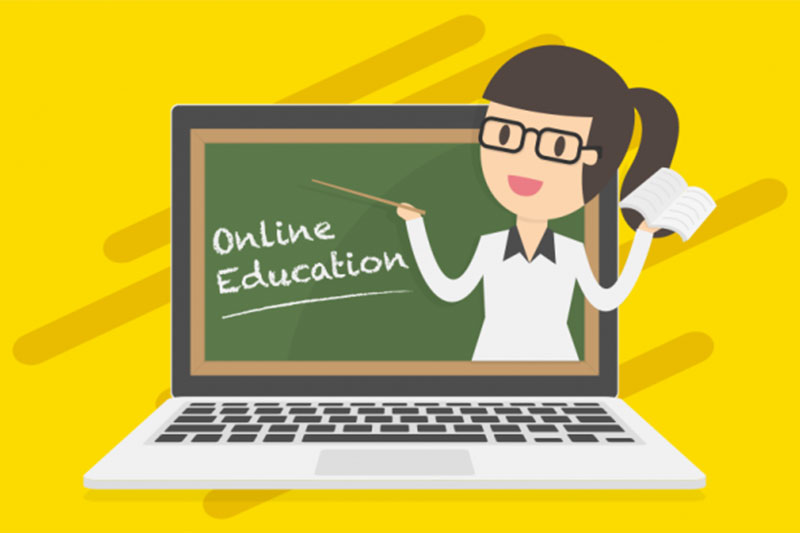The education sector is undergoing a structural change across the globe due to the Covid-19 pandemic. However, despite the challenges of adaptability, online mode of education or e-learning is becoming the new normal.
By Rayees Masroor
The deadly second wave of the novel coronavirus and the prolonged lockdown has resulted in the closure of schools, colleges and universities, which has sowed the seeds of anxiety and uncertainty among the students, guardians, teachers and the government authorities. In addition, the Covid-19 pandemic has disrupted the education sector globally. As the number of cases continues to rise, there is no certainty about when and how normalcy will be restored in the education sector.
To keep students’ education on track seems to be a mammoth task for the stakeholders. This has encouraged some permanent tilt towards online education. The new National Education Policy (NEP-2020) also talks about being ready for digital and online education. As we move forward, online learning and education will gain more space, but at the same time, we need to be cautious about the key challenges for the online education system.

One of the big challenges comes from a digital divide that can negatively impact the whole process. National Statistical Office (NSO) survey 2017-2018 has highlighted caution against a sudden push towards online education in India. There is always a risk of excluding a significant number of students. Three-fourth of students in India did not have access to the internet at home, according to the NSO survey. The share of those who did not have computers, laptops, palm-tops and tablets, was much greater–89%. Even at the higher levels, a large share of students did not have these facilities available. Access to the internet and computers is directly related to economic status. Mobile phones can be used to participate in online lectures or accessing the study material, but it is not convenient for writing assignments or exams. The online education system or e-learning also poses a challenge in terms of adaptability as both the students and the teachers are not used to this platform. Even the parents and the authorities were not prepared to make a shift towards online learning.
“It may not be possible or even feasible to make a wholesale shift towards the digital platforms or e-learning but it comes with many advantages to the students and the educators.”
Imparting education through online and digital platforms also needs sound technical skills and sophisticated gadgets, which often becomes a hurdle in the way. Computer knowledge and time management are also an issue because many teachers still lack computer knowledge, limiting their ability to impart online education. Time management, concentration, and self-motivation are not easy when you are used to physical classroom transactions and developed interests, habits, and hobbies in that system. Without foreseeing the prospects of online education, teachers have not been trained for the same. Besides this, a good classroom teacher doesn’t need to be a good teacher in the online classroom. There are a limited number of resources available to conduct an online examination in India. Many subjects and courses such as science and performing arts cannot be taught in the digital education space. E-learning or online education system is more of a type of screen-based learning system that restricts the students from performing practicals.

Despite all these challenges, the National Education Policy (NEP) 2020 has stressed the growing need for online education in India. Since the whole world is going through a pandemic and the subsequent lockdown, it has become imperative that we have some alternative mode of education, and this is where online education has come into the picture. Adjusting to an online learning model could be a challenge at first, but once you adapt to the format, numerous benefits are realized. Regardless of why you choose to pursue online education, learning through online mode can better prepare you for career advancement in a globalized workforce. The (NEP) 2020 is designed to maximize the benefits of digital and online education in India while mitigating the downsides.
The new education policy has come with some initiatives comprising pilot studies and the installation of virtual labs to reshape the system of education in India. Some of the key initiatives listed by the new educational policy include the development of well-designed and structured online teaching tools and methods, teachers’ training, digital infrastructure, virtual labs, teleclasses, courses and availability of study material in various regional languages. It also emphasizes the online assessment and examination and development of a digital repository, content creation and dissemination.
Looking at the future regardless of the challenges in its way, online education seems to be the ‘new normal. It may not be possible or even feasible to make a wholesale shift towards digital platforms or e-learning. Still, it comes with many advantages to the students and the educators. It offers teachers an efficient way to deliver lessons to the students through many tools such as videos, PDFs and podcasts, etc. By extending the lesson plan beyond traditional textbooks to include online resources, teachers can become more efficient educators. It allows students to attend classes from any location of their choice. The educational institutions can reach out to a more extensive network of students instead of being restricted by geographical boundaries. The videos or the lectures can be recorded, archived and shared for future reference. This allows students to access the learning material at any convenient time.
Online education is far more affordable as compared to physical learning. This is because online learning eliminates the cost points of student transportation, student meals etc. There is hardly any need for printing which makes it more convenient and creates a paperless environment. It provides scope for various teaching and learning styles with a wide range of options and resources. There is a possibility of improved students’ attendance because a location of choice is available to the learner. It offers self-paced learning and more flexibility. Looking forward, online education and learning seem to have great potential to prepare the coming generations for a globalized workforce.
The author can be reached at [email protected].
Leave a Reply